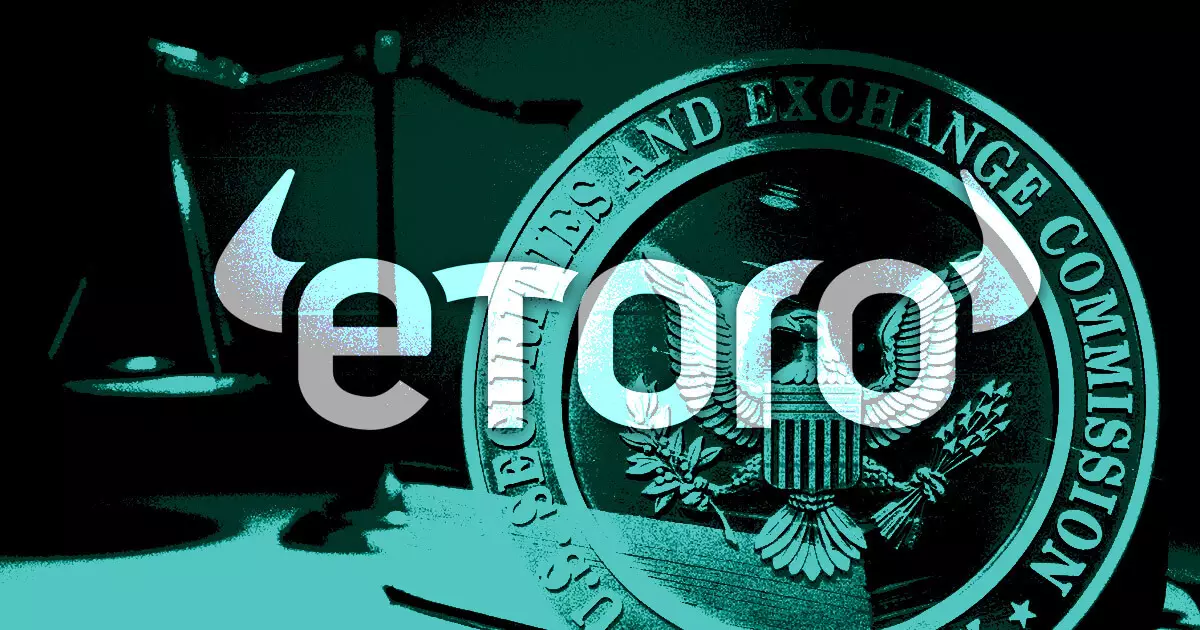The landscape of cryptocurrency trading is undergoing a seismic transformation, particularly for platforms operating within the US. One notable player, eToro, has recently found itself at a crossroads following a settlement with the US Securities and Exchange Commission (SEC). This decision, culminating in a $1.5 million settlement announced on September 12, highlights the increasing scrutiny crypto firms face from regulatory bodies. As the company grapples with compliance issues that have surfaced since 2020, this development marks a critical pivot not only for eToro but for the broader crypto trading ecosystem.
The core of the SEC’s investigation centered on eToro’s facilitation of crypto trading in assets classified as securities by federal standards. These activities persisted without the company adhering to compulsory registration protocols, raising significant legal implications. Although eToro has neither accepted nor rejected these assertions from the SEC, the firm’s decision to scale back its crypto offerings underscores a strategic shift towards compliance. This move will now confine their offerings predominantly to established cryptocurrencies like Bitcoin, Bitcoin Cash, and Ethereum.
From an investor’s perspective, this settlement poses several questions regarding future trading within eToro. The implications extend beyond mere compliance; the firm’s actions may influence how investors engage with cryptocurrencies. As eToro scales back its offerings, users are encouraged to either liquidate their crypto positions or transfer them into eToro’s wallet before an upcoming deadline. The deadline by March 18, 2025, for liquidation of unsupported assets may be a cause for concern among investors, who must now navigate this shifting terrain with caution.
Moreover, conversations around investor protection are coming to the fore, as Gurbir S. Grewal, SEC Director of Enforcement, emphasized that the resolution aims not just to rectify eToro’s past actions but also to set a precedent for other companies in the industry. The message is clear: compliance is becoming increasingly imperative for maintaining a competitive edge in a tightly regulated landscape.
As eToro adjusts its business model in light of regulatory expectations, CEO Yoni Assia conveyed an optimistic outlook for the firm’s future. The drive towards compliance is a necessary evolution—alleviating regulatory pressures while potentially paving the way for innovative product offerings. Assia’s assertion about a hopeful regulatory framework for crypto assets in the US mirrors sentiments echoed by many within the crypto community, suggesting that transparent regulations could foster a healthier trading environment.
Ultimately, the episode marks more than just an internal decision for eToro; it signifies a larger trend where companies must align their operations with a stringent regulatory framework to thrive in the US market. As industry participants watch for forthcoming regulatory clarity, eToro’s experience may act as a litmus test for the future direction of cryptocurrency trading nationwide.
EToro’s settlement with the SEC underscores the precarious balance between innovation and regulation in the cryptocurrency space. While the movement towards compliance is surely a step in the right direction, it serves as a cautionary tale for other players in the sector. As the regulatory landscape evolves, it is clear that adaptability and a commitment to lawful operation will be crucial for survival in this increasingly complex financial arena. The ongoing developments will undoubtedly continue to shape the future of cryptocurrency trading and investor engagement in the years to come.















Leave a Reply